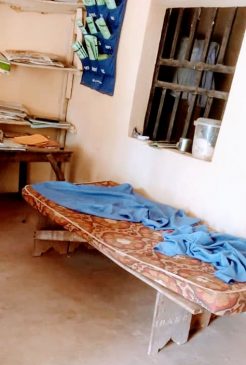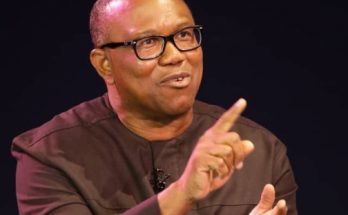Improving health outcomes in Nigeria is essential for sustainable development, social stability, and economic growth.
By Fada Emmanuel Uchechukwugeme Ogbu.
Health is a fundamental aspect of human existence. It relates to the state of being physically, mentally and socially well. Maintaining good health is essential for individuals to function optimally and lead a fulfilling life. A healthy population is vital for sustainable development, social stability, and economic growth.
Unfortunately, in Nigeria, the state of health is not encouraging, with challenges such as a poorly funded health system, dilapidated health centers, and the lack of adequate medical personnel, leading to a high rate of illness and death.

In this article, we will examine the criticality of health in Nigeria, the health budget for 2024, the state of the health centers, the work attitude of health workers, deception by the government, the death rate as a result of malnutrition and hardship, brain drain of skilled health workers and the way forward.
Is health actually critical in Nigeria?
The answer is a resounding yes. One of the major reasons why health is critical in Nigeria is that the country accounts for a significant portion of the global disease burden. According to the World Health Organization (WHO), Nigeria accounts for about 14% of maternal deaths globally. Nigeria also accounts for over 25% of the global burden of malaria, with 97% of the population at risk of the disease. Nigeria is also one of the top countries with the highest prevalence of HIV/AIDS in the world.
These statistics are worrisome and underscore the importance of improving the health outcomes in Nigeria. One may start to wonder why the Nigerian government have not declared an emergency in the health sector with this information about health in Nigeria.
The Nigeria Health Budget.
What is the Nigerian health budget for 2024? The Nigerian government approved a budget of N547 billion for the health sector in 2022. This is a slight increase from the previous year’s budget. The budget includes provisions for infrastructure development, healthcare services, and the procurement of medical equipment, among others. However, this budget is still below the recommended WHO budget of 15% of the total national budget. The low budget allocation limits the government’s capacity to provide adequate healthcare services, leading to a low level of health outcomes in the country. Even at that, does the government in actuality invest two percent of this health budget in the health sector? Does the amount invested get to the grassroot (community health centers)?

The answer is NO. According to the Centre for Social Justice, in its review of the 2024 Federal Health Budget Proposal, the total sum allocated out of the overall expenditure of ₦27,503,404,073,861 is ₦1,228,100,390,765 inclusive of the ₦ 125,737,146,031 provided for the Basic Health Care Provision Fund (BHCPF). This is 4.47% of the proposed budget expenditure. For a population of about 240 million, the federal allocation amounts to ₦5,117 for every citizen of Nigeria.
In United States dollar terms, the allocation translates to 3USD at N1700 for 1 USD per individual. That notwithstanding, Premium Times on 30th December 2023, made it clear that the Senate passed the 2024 budget with an increase of about N1.2 trillion. It increased the budget from N27.5 trillion presented by President Bola Tinubu in November to N28. 7 trillion. Nothing was added to the health budget.
The State of the Community or Primary Health Care Centers.
The summary of the definition of Primary Health Care (PHC) according to the World Health Organization is a broader whole-of-society approach with three components: (a) primary care and essential public health functions as a core of integrated health services; (b) multisectoral policy and action; and (c) empowered people and communities.

Hence the interest in Community Health Clinics/Centers forms the base as it deals directly with the rural and locals.
The components of PHC consist of: Health education; Availability, accessibility, and affordability of health services; Immunization; Provision of essential medicines; Treatment of communicable diseases; Water and sanitation; Promotion of mental health and rehabilitation; Maternal and child healthcare, etc.
Having said that, it is important to note that the dilapidated nature of our community healthcare centers is one of the most significant challenges facing the health sector in Nigeria.
Most of our health centers are in a state of disrepair, with inadequate medical equipment and poor facilities. The state of the health centers is so bad that it is common for patients to bring their beds and beddings to the hospitals for treatment. This problem is worse in rural areas, where many communities do not have access to health care centers, making it difficult for people in these areas to access basic medical care. Some travel miles to even find a functional health post.
The Work Attitude of Community Health Workers.
The above situation has given the health workers enough reasons to establish private health centers in their homes and they now attend to the people from their private homes (while still receiving their monthly salaries). This working attitude of the health workers is another big challenge facing the health sector in Nigeria. When confronted, some of them will reference medical doctors who also own private clinics even as they work in the government hospitals. It is not unusual to find health workers absent from their duty posts or unwilling to work when they are on duty?
The situation here is not willingness but total closure of the health facilities in rural areas. In some cases, health workers demand bribes before attending to patients, which further aggravates patients’ challenges. The poor work attitude of health workers has led to a loss of confidence in the health system and reduced the quality of healthcare services in Nigeria.
The Deception by The Nigerian Government on Health Issues.
The deception by the government in the name of supplying drugs to the health centers is another significant challenge. The government often claims to have supplied drugs and other medical equipment to the health centers, while in reality, such supplies are incomplete or do not exist at all. This deception makes it challenging for even the functional health centers to provide quality treatment to patients who depend on them. The only time staff show face in the health centers is when they have a particular immunization to carry out. No checks, no controls!

Brain Drain of Skilled Health Workers in Nigeria.
Brain drain refers to the emigration of highly skilled and educated individuals from their home country to another country (Japa syndrome), leading to a loss of valuable human resources. Nigeria has been experiencing a brain drain of public health workers for decades.
The reasons for this brain drain include: poor working conditions, inadequate remuneration, lack of opportunities for professional development, and insecurity. Many public health workers in Nigeria are overworked and underpaid, which leads to burnout and frustration. It is worse in private health sections where a qualified nurse receives less than ₦30,000 a month, an equivalent payment for a two-hour job elsewhere.
However, the lack of equipment, facilities, and supplies, coupled with the high level of insecurity in some parts of the country, make it difficult for public and private health workers to carry out their duties effectively. As a result, many of them opt to leave the country in search of better opportunities and a better standard of living leading to a shortage of skilled manpower and expertise, which can jeopardize the health of the population.
Implication of Doctor-patient ratio in Nigeria
According to PUNCH Online investigation (4 Dec 2023), 1,197 Nigerian-trained doctors moved to the United Kingdom since May 29, 2023 to 4 Dec 2023. At the moment, Nigeria is set to overtake Pakistan and become the country with the second-highest number of foreign-trained doctors in the UK. Between 2016 and 2018, over 9 000 medical doctors were reported to have left Nigeria in search of greener pastures in the United Kingdom (UK), USA and Canada (20 Dec 2022 report).
Nigeria’s doctor-population ratio hovered around 2.65 in 2003 and 3.81 in 2018., the Executive Director, National Primary Health Care Development Agency (NPHCDA) Faisal Shuaib said four doctors attended to 10,000 Nigerians. He noted that the figure fell short of the United Nations’ recommendation (17 Mar 2022 report). Physicians (per 1,000 people) in Nigeria was reported at 0.395 in 2021, according to the World Bank collection of development indicators, compiled from officially recognized sources. Nigeria – Physicians actual values, historical data, forecasts and projections were sourced from the World Bank on February of 2024.
Given the fact that there are only 24,000 doctors available, the current doctor-patient ratio is 1:9,083, a stark contrast with WHO’s recommendation of One doctor to 600 patients. With 218 million people to cater for, Nigeria requires at least 363,000 additional doctors to meet this target. (20 Oct 2022 report).
This is why in most hospitals, doctors are tired, worked up and lash their frustrations on the patients and or their caregiver. This situation can also account for the shabbiest responses and attention from the medical personnels.
Death Rate as a Result of Malnutrition and Hardship
It is pertinent to have a true concise knowledge of what constitutes health ideally to be able to appreciate this paragraph. The WHO constitution states that: “Health is a state of complete physical, mental and social well-being and not merely the absence of disease or infirmity.”
By this definition, malnutrition and hardship are vital aspects of human health. That makes the death rate as a result of malnutrition and hardship another critical issue facing the health sector in Nigeria today. Children under the age of five in Nigeria and poor rural dwellers suffer serious malnutrition as a result of poverty and hardship created by the governing class. Many families today find it very difficult to access an adequate supply of food. The harsh economic policies of the government of the day have also contributed to the high rate of illnesses and death in Nigeria. And these men and women in power still live in deception as if nothing is happening.
The Way Forward
The way forward requires a strategic approach that involves both the government and civil society. The government needs to increase its budget allocation for the health sector to enable it to provide adequate healthcare services.
It is very noteworthy to state here that the efficacy of any budget is not determined by the figures allocated and, or its subsequent release but by proper disbursement and optimal utilization by the Ministries, Departments Agencies and Persons/Personalities involved. Remember now that the remuneration of workers, procurement or repair of equipment, establishment of facilities, working conditions, motivation of workers, security of facilities (health centers and hospitals) all lie in the effective implementation of the above.
Thus, the Nigerian government needs as a matter of urgency, to provide better working conditions and remuneration for public health workers, and implement policies to retain talented professionals in the country.
The government must address the work attitude of health workers and ensure that they are adequately remunerated to improve their performance. Civil society also has a critical role to play in improving the state of health in Nigeria. Civil society organizations can raise awareness about health issues, advocate for better health policies, and monitor the government’s performance in the health sector.
Civil society organizations can also provide support for health workers and contribute to improving the facilities in the health centers. Individual philanthropists can partner with civil society organizations and or trusted NGOs to bring standard and low-cost or even free medicals to poor rural dwellers. The Catholic Church Lenten teaching or call has its root in the Bible passage that reads: “Whatsoever you do to the least of my brothers or sisters, that you do unto me…” – Matthew 25:40.
Conclusion
Actually, health is critical in Nigeria, and the government of the day faces significant challenges in providing adequate healthcare services. The challenges include a poorly funded health system, dilapidated health centers, and a lack of adequate medical personnel, leading to a high rate of illness and death. The way forward requires a strategic approach that involves both the government and civil society. Improving health outcomes in Nigeria is essential for sustainable development, social stability, and economic growth.




